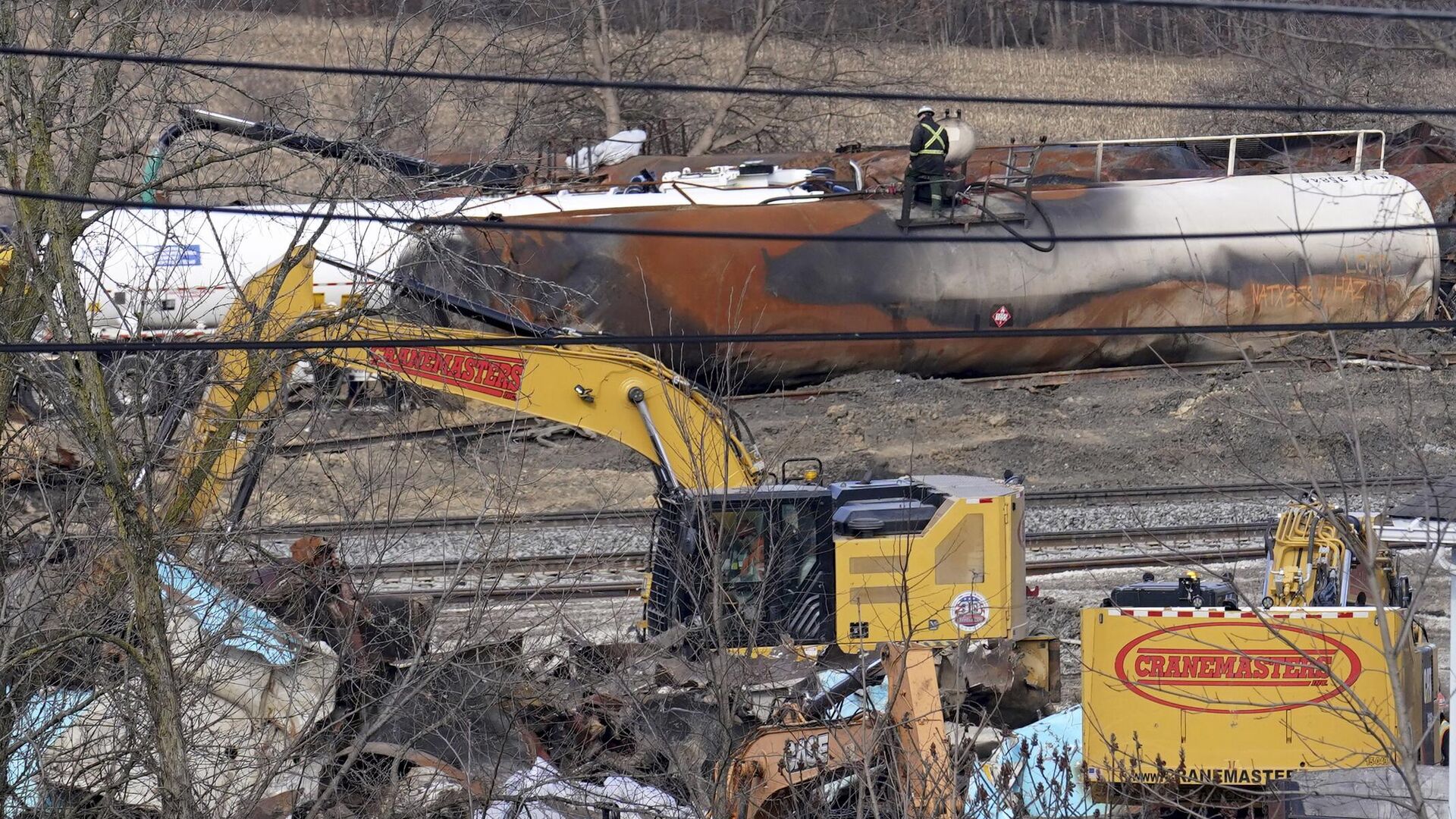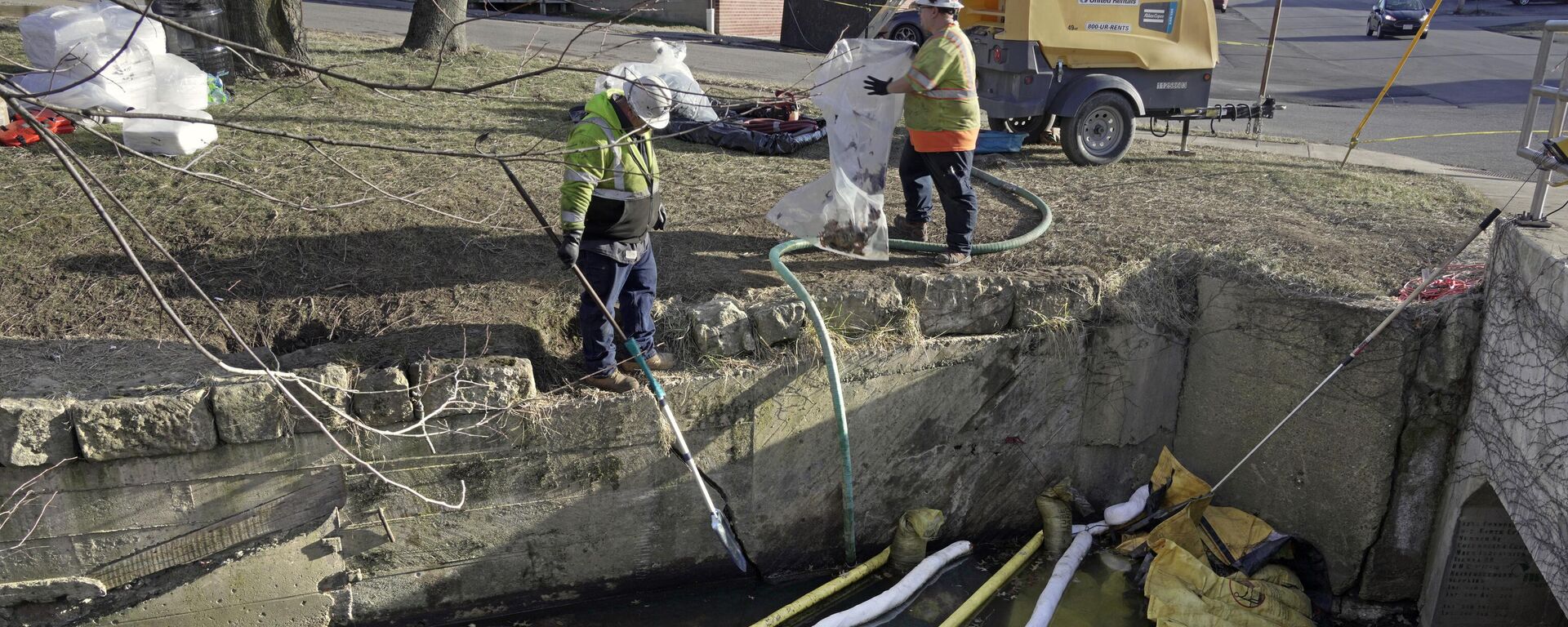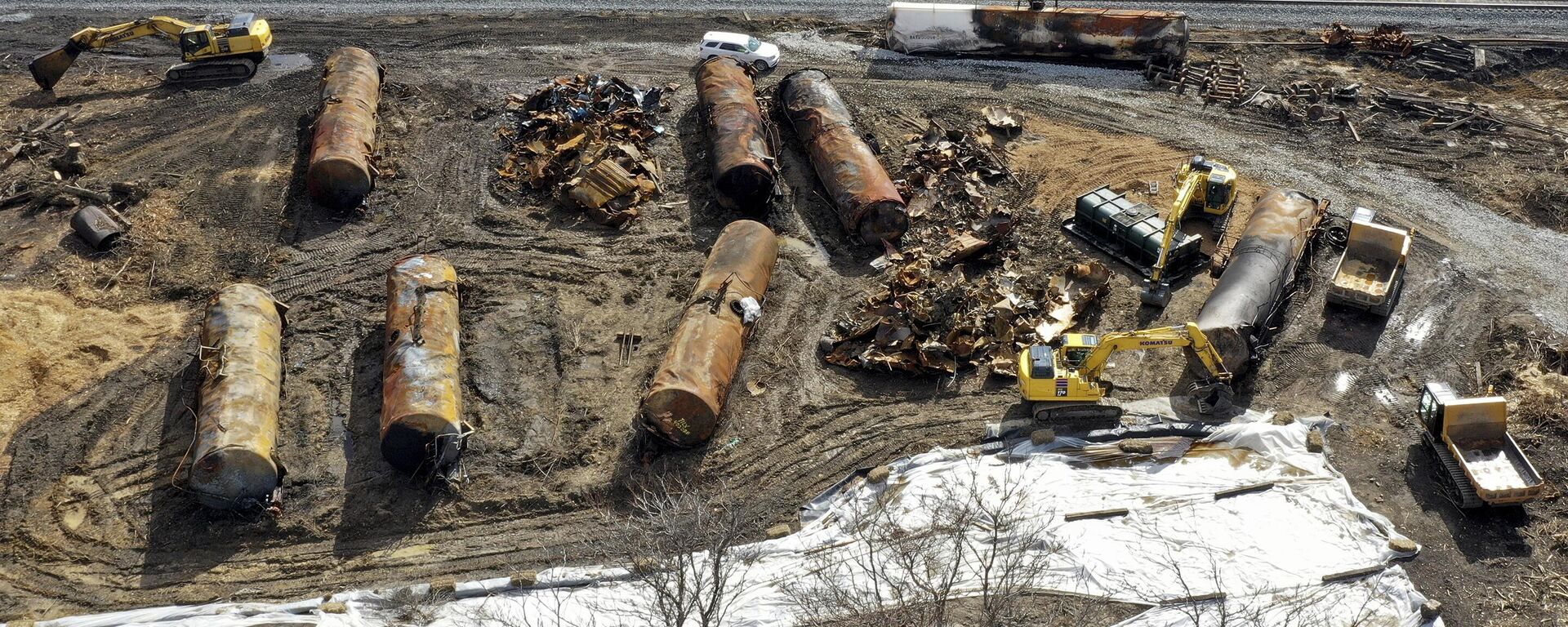https://sputnikglobe.com/20230303/report-railcar-that-overheated-in-east-palestine-crash-was-owned-by-lessor-not-railroad-1107997550.html
Report: Railcar That Overheated in East Palestine Crash Was Owned by Lessor, Not Railroad
Report: Railcar That Overheated in East Palestine Crash Was Owned by Lessor, Not Railroad
Sputnik International
Investigators have chased down the origins of the car whose axle failed on a Norfolk Southern train in East Palestine, Ohio, on February 3.
2023-03-03T22:48+0000
2023-03-03T22:48+0000
2023-03-03T22:47+0000
americas
east palestine
norfolk southern railroad
deregulation
us
https://cdn1.img.sputnikglobe.com/img/07e7/02/17/1107724494_0:111:2138:1314_1920x0_80_0_0_eedeb7b4a3541452aec84be632083910.jpg
Investigators have chased down the origins of the car whose axle failed on a Norfolk Southern train in East Palestine, Ohio, on February 3.The car, a covered hopper that was transporting a bulk cargo consisting of plastic pellets, began its fateful journey in Houston, Texas, when a small railroad operator, the Port Terminal Railroad Association, delivered the car to a rail yard operated by Union Pacific, one of the four major freight railways in the United States.According to railroad spokespersons, the car did not set off any safety alarms during its trip from Houston to St. Louis, and only set off alarms in the miles leading up to the derailment in East Palestine.The National Transportation Safety Board (NTSB) said in a preliminary report last week that the railcar’s axle had been identifiably heating up at least 20 miles before the crash. The train was in the process of slowing down after the car triggered a safety alarm in East Palestine when the car’s axle finally failed and it derailed, taking 37 other cars with it, including several carrying toxic chemicals.According to US media reports, the railcar belonged to GATX Corp., which operates a massive railcar leasing operation. The Chicago-based company owns nearly 110,000 railcars in North America and leases them to railways or businesses for hauling cargo. However, reporters were unable to determine which company had leased the car at the time of the crash.The car was built by Trinity Industries in 1997 and certified for 50 years of service.Smaller freight lines had long suffered from stiff competition posed by air freight and trucking, and complained that federal regulations made them unable to compete. After a series of major bankruptcies in the early 1970s threatened to leave large parts of the northeastern United States without rail service, the federal government bought up the failing companies and combined them into the state-owned Consolidated Rail Corporation (Conrail). A similar process at the same time created Amtrak, the country’s state-owned national passenger rail service.When the hopper’s axle failed in East Palestine, the car pileup triggered a large fire that took several hours to put out. However, it also damaged the aluminum protective casings on several freight cars carrying vinyl chloride, and authorities feared the cars were primed to explode. They ordered an evacuation of the city and carried out a “controlled release” that amounted to burning the cargo on three of the cars.The Environmental Protection Agency has ordered Norfolk Southern to conduct the cleanup and pay for the damages.
https://sputnikglobe.com/20230301/east-palestine-residents-reportedly-suffering-from-chemical-bronchitis-after-train-derailment-1107898184.html
https://sputnikglobe.com/20230303/what-does-this-guy-gotta-do-to-get-fired-cruz-rips-buttigieg-for-ohio-train-wreck-response-1107968096.html
americas
east palestine
Sputnik International
feedback@sputniknews.com
+74956456601
MIA „Rossiya Segodnya“
2023
News
en_EN
Sputnik International
feedback@sputniknews.com
+74956456601
MIA „Rossiya Segodnya“
Sputnik International
feedback@sputniknews.com
+74956456601
MIA „Rossiya Segodnya“
us, deregulation, norfolk southern railroad, east palestine, ohio
us, deregulation, norfolk southern railroad, east palestine, ohio
Report: Railcar That Overheated in East Palestine Crash Was Owned by Lessor, Not Railroad
The covered hopper car that suffered an overheated axle and caused the massive train crash in eastern Ohio last month reportedly didn’t belong to the Norfolk Southern Railroad that was pulling it. A massive railcar leasing market was created in the 1980s after the railroad industry was deregulated.
Investigators have chased down the origins of the car whose axle failed on a Norfolk Southern train in East Palestine, Ohio, on February 3.
The car, a covered hopper that was transporting a bulk cargo consisting of plastic pellets, began its fateful journey in Houston, Texas, when a small railroad operator, the Port Terminal Railroad Association, delivered the car to a rail yard operated by Union Pacific, one of the four major freight railways in the United States.
The car was inspected on January 29 and put on a northbound train to St. Louis, Missouri, the following day. In Norfolk, the small Terminal Railroad Association of St. Louis railway took the car to a rail yard operated by Norfolk Southern, which put it on a 149-car eastbound train heading to Conway, Pennsylvania.
According to railroad spokespersons, the car did not set off any safety alarms during its trip from Houston to St. Louis, and only set off alarms in the miles leading up to the derailment in East Palestine.
The National Transportation Safety Board (NTSB)
said in a preliminary report last week that the railcar’s axle had been identifiably heating up at least 20 miles before the crash. The train was in the process of slowing down after the car triggered a safety alarm in East Palestine when the car’s axle finally failed and it derailed, taking 37 other cars with it, including several carrying toxic chemicals.
"We call things accidents – there is no accident. Every single event that we investigate is preventable,” NTSB chair Jennifer
Homendy told reporters, adding the derailment was “100% preventable.”
According to US media reports, the railcar belonged to GATX Corp., which operates a massive railcar leasing operation. The Chicago-based company owns nearly 110,000 railcars in North America and leases them to railways or businesses for hauling cargo. However, reporters were unable to determine which company had leased the car at the time of the crash.
The car was built by Trinity Industries in 1997 and certified for 50 years of service.
This confusing system is largely the product of extensive
industry deregulation in the 1980s, beginning with the Railroad Revitalization and Regulatory Reform Act of 1976 and continuing with the Staggers Rail Act of 1980.
Smaller freight lines had long suffered from stiff competition posed by air freight and trucking, and
complained that federal regulations made them unable to compete. After a series of major bankruptcies in the early 1970s threatened to leave large parts of the northeastern United States without rail service, the federal government bought up the failing companies and combined them into the state-owned Consolidated Rail Corporation (Conrail). A similar process at the same time created Amtrak, the country’s state-owned national passenger rail service.
When the hopper’s axle failed in East Palestine, the car pileup triggered a large fire that took several hours to put out. However, it also damaged the aluminum protective casings on several freight cars carrying vinyl chloride, and authorities feared the cars were primed to explode. They ordered an evacuation of the city and carried out a “controlled release” that amounted to burning the cargo on three of the cars.
The fire
poured toxic gasses across the area, including hydrogen chloride and phosgene. While authorities claimed the area was safe for humans to return, numerous residents have
complained of breathing problems and the deaths of pets and wildlife have become common occurrences.
The Environmental Protection Agency has ordered Norfolk Southern to conduct the cleanup and pay for the damages.




